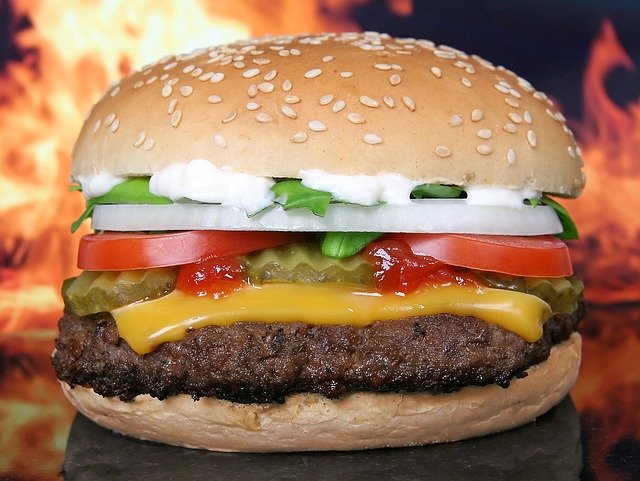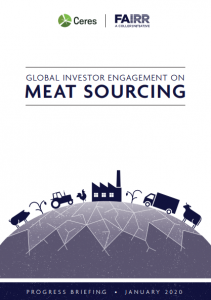Investors press fast food giants for more urgent action on climate and water risk management
- January 29, 2020
- Posted by: administrator
- Category: Companies, Corporate, Environmental, Global, Water Issues

A global investor coalition representing more than $11.4 trillion of assets is calling on six of the world’s largest fast food companies to take faster and deeper action to manage climate and water risks in their supply chains.
The coalition, facilitated by global investor network FAIRR and sustainability organisation Ceres, originally launched in January 2019 with combined assets of $6.5 trillion. In one year, it has grown by 75% to include over 90 investors with combined assets of $11.4 trillion.
The brands the investors are engaging with are:
- Burger King (owned by Restaurant Brands International )
- Chipotle Mexican Grill
- Domino’s Pizza
- KFC (owned by Yum! Brands)
- McDonald’s
- Pizza Hut (owned by Yum! Brands)
- Wendy’s Co.
The firms are being asked to set aggressive targets to reduce their greenhouse gas emissions, water usage and water quality impacts of their meat and dairy supply chains.
 One year into the engagement, the results show some progress across the key requests made by the investors, according to new analysis released by Ceres and FAIRR.
One year into the engagement, the results show some progress across the key requests made by the investors, according to new analysis released by Ceres and FAIRR.
However, the fast food companies’ efforts thus far do not sufficiently mitigate their exposure to the considerable physical, regulatory, and reputational risks climate change poses to animal agriculture. In addition, the investor coalition says the companies are not responding at the pace required to match the magnitude of their environmental impacts.
Of the six engaged companies:
- Two (McDonald’s and Yum Brands!) have set or publicly committed to set science-based emission reduction targets, which are adequate for limiting global warming to well below 2 degrees celsius above pre-industrial levels, with the aim of limiting warming to 1.5 degrees. Restaurant Brands International has stated its intention to set an emissions reduction target for its restaurants in the U.S. and Canada.
- Only one (McDonald’s) has publicly disclosed that it has conducted a water risk assessment specifically for meat and dairy suppliers. Restaurant Brands International plans to conduct a life-cycle assessment which will consider its water footprint, among other impacts.
- None have set specific requirements on climate and water for meat and dairy suppliers, with unclear compliance monitoring systems across the board.
The six fast food companies have a combined market cap of over $260 billion and collectively manage over 120,000 restaurants worldwide. Today’s analysis is based solely on public disclosures to date and does not reflect key improvements discussed in private dialogues.
“Companies failing to respond at pace and with detail required by investors”
Aarti Ramachandran, Head of Research and Engagements, FAIRR Initiative said:
“Investors are concerned about the climate impacts of our burgers and burritos. Feed for livestock alone uses around a third of annual global water withdrawals and is a major emitter of greenhouse gases. Failure by the global fast food sector to tackle the environmental issues in their supply chains puts the long-term financial sustainability of their businesses under threat. Investors are asking the industry to manage these risks, using tools such as water risk assessments and science-based emissions targets, but the companies are failing to respond at the pace and with the detail required by investors.”
Eugenie Mathieu, Senior SRI Analyst, Aviva added:
“To create a pathway to achieving the Paris Agreement and to avoid water scarcity, the food sector needs to show that it is managing its emissions and water usage with the same urgency and focus as any other acute business risk. This engagement sets out clear investor expectations from fast food giants. These firms are leaders in fast food, and we would like them to demonstrate similar leadership in managing the material financial risks of climate and water in their supply chains.”
Fast food companies have “long lagged behind” other high-emitting water-intensive industries
The second phase of the Ceres/FAIRR engagement has been launched with the investor coalition writing to each company with specific tailored requests based on their current strategies. The engagements are also supported by members of the Interfaith Center on Corporate Responsibility (ICCR).
Kirsten James, Director of Water, Ceres said:
“Fast food companies have long lagged behind other high-emitting and water-intensive industries that take these material, financial and reputational risks seriously. It is time for these companies to have a plan and take urgent steps to ensure their meat and dairy supply chains are resilient to the impacts of rising temperatures and extreme droughts and flooding. Investors are not only demanding action, but they want more information about the concrete steps that companies are taking to tackle supply chain issues — the cost of ignoring them is too high.”
The Ceres Investor Network on Climate Risk and Sustainability comprises 163 institutional investors, collectively managing more than $25 trillion in assets.
FAIRR has more than 200 institutional investors with over $20 trillion of combined assets participating in its activities.
Click here to access the report
